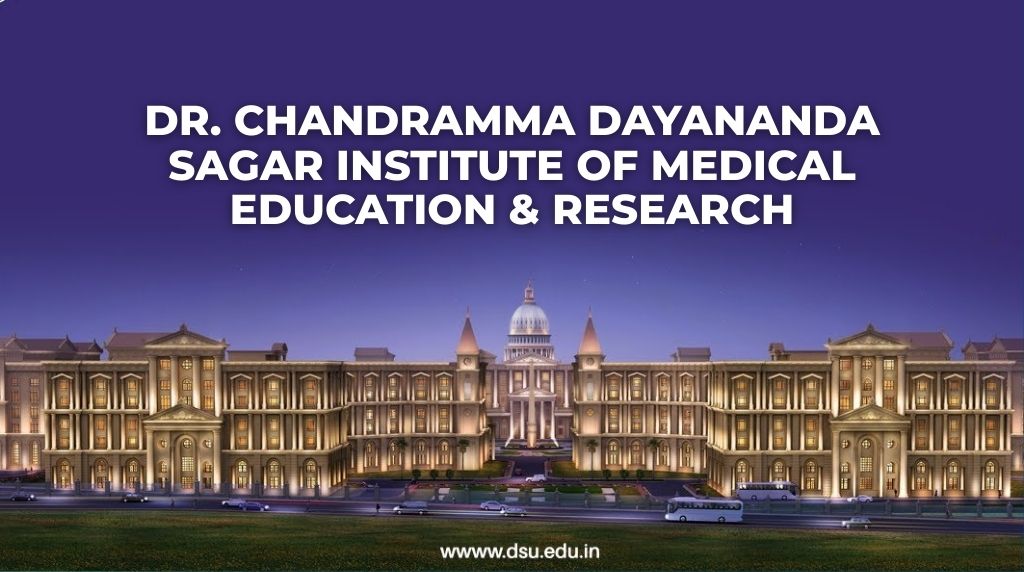
Dr. Chandramma Dayananda Sagar Medical College, located in Bangalore, is a premier institution dedicated to excellence in medical education, research, and healthcare. Established with the vision of nurturing compassionate and skilled healthcare professionals, the college is part of the renowned Dayanand Sagar Group of Institutions, known for its commitment to academic excellence. The college offers MBBS and MD/MS programs in medicine, supported by a strong curriculum, advanced laboratories, and a highly qualified faculty.
With state-of-the-art infrastructure, a teaching hospital providing extensive clinical exposure, and a focus on innovation, the college equips students with practical skills and ethical values essential for modern medical practice. Situated in the educational hub of Bangalore, it fosters a vibrant learning environment and encourages research, community service, and holistic development, preparing students to serve society with dedication and expertise.

Undergraduate (UG) Program
The duration of MBBS at DSIMER is 4.5 years of academics plus 1 year of compulsory rotating internship. The Intake is 150 seats per year for MBBS. Eligibility is admission via NEET-UG. Counselling is conducted by Karnataka Examination Authority (KEA). Standard eligibility (PCB in 12th, etc.) applies.
Postgraduate (MD / MS)
As DSIMER is a newer college, the PG/MD-MS programme offering is limited as of now but it is growing.
- DSIMER offers MD in Pathology – 4 seats.
- MD in Community Medicine – 4 seats.
- These are currently the explicitly listed PG degree courses. Given that the college is newer, the PG specializations are fewer compared to older institutions.
- The PG (MD / MS) courses are of the standard duration: 3 years.
Eligibility & Admission Process
- Must have an MBBS degree from a recognized medical college.
- Must have completed the one-year rotating internship before the date prescribed.
- Admission is based on performance in NEET-PG, a national level entrance exam.
The seat allotment and counselling are handled through the Karnataka Examination Authority (KEA) for the state quota seats.
Fees & Financial Aspects
The fee data interpreted for 2025-26:
MD Pathology fees:
• General seats: ~ ₹ 4,25,750 per year.
• Under the management / NRI quota: ~ ₹ 8,15,750.
MD Community Medicine fees:
• General seats: ~ ₹ 3,40,750 per year.
• Management / NRI quota: ~ ₹ 5,15,750.
For MBBS (just for perspective), the fees are much higher under private / management / NRI quotas, whereas government quota seats have relatively lower fees. E.g., MBBS private quota fee ~ ₹ 22,15,750 and NRI / similar quota ~ ₹ 38,15,750 as per recent information.
Infrastructure, Hospital & Clinical Exposure
- Hospital beds / Teaching Hospital: The attached hospital (Dayananda Sagar Hospital) has ~ 605 beds for teaching (as per data in 2025). This gives foundation for clinical exposure.
- Outpatient & Patient Load: The hospital has daily outpatient numbers noted (OPD/day) ~ 1,050+. (That means every day a large number of patients are seen. Good for PG exposure especially in certain departments.)
- Faculty & Departments: Since PG is limited to a few departments for now (Pathology, Community Medicine etc.), the number of senior faculty in those areas would be relatively smaller but presumably qualified. The newer college status means some departments and super-specialty exposure may yet be under development. (No public data yet on the large number of super speciality seats.)
- Hostel / Accommodation: Hostels for male and female students are available. The campus has residential facilities.
- Campus Facilities & Location: The campus is relatively new, sizable. Some students mention that it is a bit remote (outside core city), so commuting / daily travel for clinical postings might be longer. Also, some of the infrastructure (library, labs, digital resources) are modern, but being new means some facilities are still scaling up. (This is not an official source but informed from student feedback / Reddit threads).
Strengths of DSIMER / Dayanand Sagar Medical College for PG Aspirants
Even though it’s a newer college, DSIMER has several advantages, especially for certain kinds of students. Lower PG Fees in General Quota (compared to older private institutions): For MD Pathology and MD Community Medicine, management / NRI fees are moderate compared to many older private colleges. If you manage to get a general or government quota seat, costs are comparatively lower. Though currently limited in number of branches, the institution is recognized for these courses and thus degrees will be valid. New medical colleges often have newer labs, better initial setups for digital classrooms, more modern building / facility design. Being part of Dayananda Sagar University helps in associated support. PG students in early batches sometimes get chances to contribute to building departments, exposure to wider roles because faculty numbers may be less and demand is high. This could lead to more responsibility and learning.
Challenges / Things to Consider
Of course, there are trade-offs and things to watch out for. For a prospective PG student, consider:
- Limited Specializations Currently Offered : At present, PG (MD/MS) offerings are few (Pathology, Community Medicine). If your interest is in core clinical branches (e.g., General Medicine, Surgery, Radiology, Anaesthesiology etc.), you may need to go elsewhere. As the college grows, more departments may be added, but none of those have been officially confirmed yet.
- Maturity of Clinical Departments: Newer colleges often take time to build high patient load, varied case mixes, especially in less common clinical specialities. For exam prep or specialization exposure, this could be a limiting factor initially.
- Location / Patient Volume: Because the college is somewhat away from the city centre, some students report that patient inflow in certain hours or days is less compared to central city hospitals. For some branches, this may impact exposure.
- Reputation & Alumni Network: Older institutions have long-standing reputations, Alumni networks, mentorships etc. In newer colleges, recruiters / institutions sometimes look at track record; being an early batch may mean fewer seniors to guide you.
- Fee for Private / Management / NRI Quota Seats: Though general quota fees are moderate, fees for private / management / NRI quotas are significantly higher. If you are not sure of getting a general quota seat, financial planning is necessary.
- Seat Recognition / Validation: Always double check that the PG seat in your specialization in a particular year is fully recognized by NMC. Sometimes recognition may be conditional or “to be permitted”.
What to Expect as a PG Student at DSIMER
- Daily Routine: Expect to spend time in departmental practicals (especially Pathology / Community Medicine), lab work, classes, journal clubs. Since there are only a few PG departments yet, much of the initial focus will be academic, theory, and basic diagnostics / labs. Over time, clinical exposures will increase.
- Workload: As in any PG, significant workload. But because PG offerings are fewer, you may have to help with cross-departmental tasks or assist faculty in administrative / academic responsibilities more than in very large colleges.
- Research / Thesis: You’ll need to complete a dissertation / thesis for your MD. Given that departments like Pathology and Community Medicine have substantial scope for research (epidemiology, lab diagnostics, etc.), you may find interesting projects. The infrastructure being newer means possible availability of better lab reagents, newer equipment, but sometimes processes might take time to settle.
- Interdepartmental Learning: Since the college is growing, you may have opportunities for interdisciplinary learning (e.g. combining epidemiology, public health, lab diagnostics etc.), especially in Community Medicine.
- Faculty Exposure: Because fewer students now, you may get more individual attention from faculty. Also possibility to influence or participate in shaping labs, systems, departmental culture.
- Living / Hostel / Commute: Because of location (Harohalli etc.), commuting to city areas might take time. Hostel facilities are present, so staying on campus or close may make sense. Consider cost, travel time, availability of facilities around.
- Growth Prospects: As college matures, PG seats may increase, new specializations may begin. If you are an early batch, being part of institution growth may position you to benefit (new labs, newer specialities, leadership roles).
Recent Trends & Developments
- Recent Intake & Growth: Since establishing an MBBS course in 2020, DSIMER has been steadily enrolling students. PG programmes started with limited seats. As the hospital operations scale up, it is likely that more PG branches will be added over the next few years.
- Infrastructure Build-up: The institution is adding facilities (hospital beds, OPD, labs etc.) to support both undergraduate and postgraduate-level demands. Faculty hiring is ongoing.
- Student Feedback: In online forums, students mention that while academic and classroom infrastructure is good, transport / commuting and patient inflow at certain times are concerns. Those are expected to improve as the college becomes more established.
Suitability: Who Is DSIMER a Good Fit For?
- Students who want to do PG in non-core clinical branches or para-clinical / community medicine / pathology etc., and are OK with newer institutions, who want somewhat lower fees (in general quota) and good infrastructure.
- Candidates who are in early batches, willing to be part of growing institution; possibly students who want better access to faculty and labs due to lower competition within departments.
- Those who plan their finances carefully, willing to accept private or NRI quotas if required, but hopeful for state/general quota seats.
- Students who don’t mind being a bit distant from city centres, or living in campus / near campus, and who value a relatively newer facility / modern labs.
- If your long term goal is super speciality / highly specialized clinical work, you’ll have to see which branches will be introduced; DSIMER right now has limited PG clinical specialities, so for branches like Surgery, Cardiology, Radiology etc., you may need to move elsewhere or transfer after PG.










Facilities at Dayananda Sagar University Medical College
Campus & Location The college is part of the Dayananda Sagar University campus. It has a large, smart campus covering ≈ 140 acres.
Hospital / Clinical Facilities
• Tertiary care hospital attached to the college, serving over 200 villages.
• Has ~ 400 beds currently, with plans to expand up to ~ 1,350 beds.
• Clinical departments include emergency medicine, diagnostics, ICU / critical care (adult, pediatric, neonatal), outpatient & inpatient services.
• Operative infrastructure: ~10 operation theatres; also 24×7 casualty / emergency services.
Academic / Teaching Facilities
• Smart classrooms, well-equipped laboratories, skills labs for clinical training.
• Central library + departmental libraries; digital / e-library / online journal access.
Hostel / Residential Accommodation • Separate hostels for boys and girls.
• Rooms are described as spacious, furnished, with necessary amenities. Common / recreation rooms etc.
Transport & Accessibility
• Buses / college-transport likely provided (standard for large campuses).
• The hospital accepts government medical schemes.
Other Amenities
• ATM / bank extension counters: Canara Bank, Karnataka Bank, Syndicate Bank on campus; ATMs of major banks.
• Cafeterias, cafes and canteens for students; places for breaks; mess facilities in hostel.
• Internet / WiFi connectivity on campus.
• Security: 24-hour security protection.
Summary
Dr. Chandramma Dayananda Sagar Institute of Medical Education & Research (DSIMER), Bangalore is a promising newer private medical college with MBBS and limited PG offerings (MD Pathology, MD Community Medicine) as of now. It offers modern infrastructure, recognized degrees, and fees that are relatively manageable under general / state quota for those PG specializations. For those wanting clinical branches not yet offered, it’s less immediately suitable, though the college seems to be growing. If you are willing to be part of an institution in expansion phase and want good lab/academic support, DSIMER might be a good option.
List Of Medical Colleges In Karnataka
- Kempegowda Institute of Medical Science Bangalore
- ST. John’s Medical College
-
MYSORE MEDICAL COLLEGE & RESEARCH INSTITUTE
